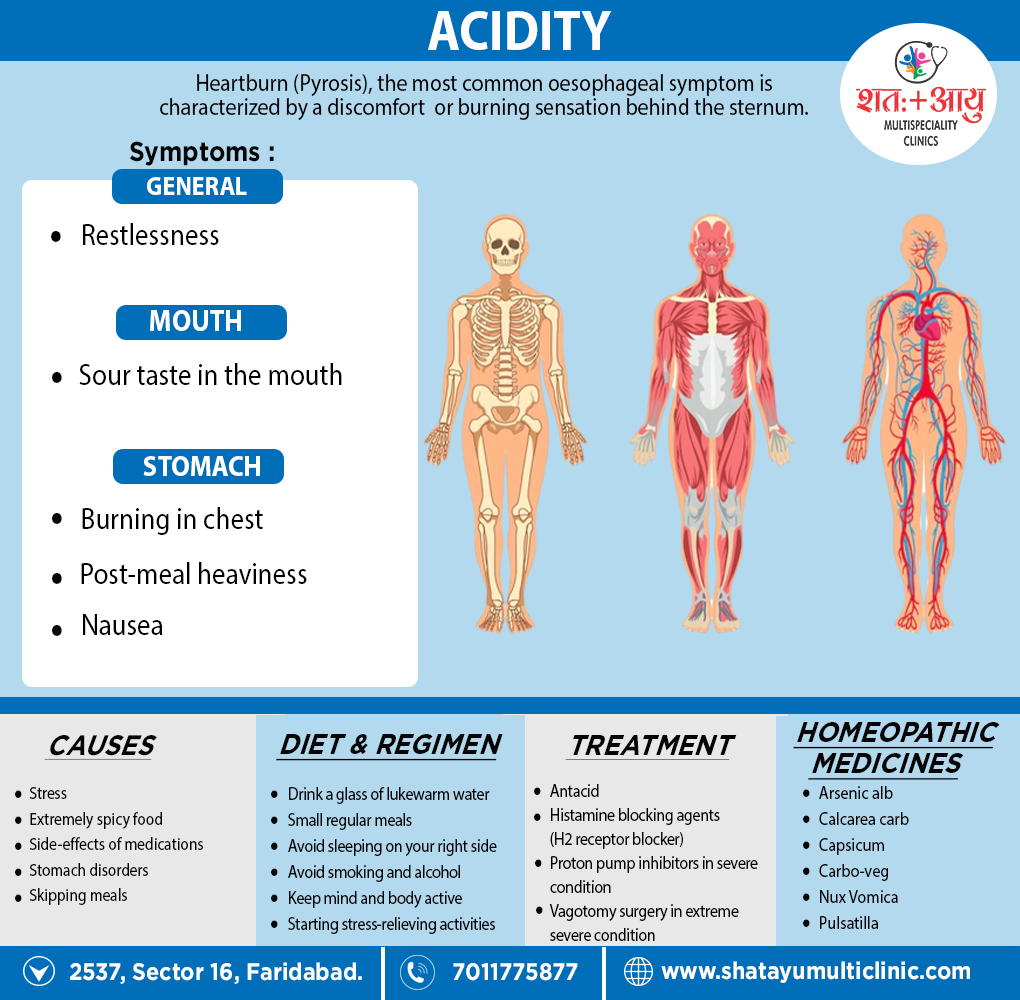Homeopathic Treatment of Acidity
Homeopathy treats the person as a whole. It means that homeopathic treatment focuses on the patient as a person, as well as his pathological condition. The homeopathic medicines selected after a full individualizing examination and case-analysis.
Which includes
- The medical history of the patient,
- Physical and mental constitution,
- Family history,
- Presenting symptoms,
- Underlying pathology,
- Possible causative factors etc.
A miasmatic tendency (predisposition/susceptibility) also often taken into account for the treatment of chronic conditions.
What Homoeopathic doctors do?
A homeopathy doctor tries to treat more than just the presenting symptoms. The focus is usually on what caused the disease condition? Why ‘this patient’ is sick ‘this way’?
The disease diagnosis is important but in homeopathy, the cause of disease not just probed to the level of bacteria and viruses. Other factors like mental, emotional and physical stress that could predispose a person to illness also looked for. Now a days, even modern medicine also considers a large number of diseases as psychosomatic. The correct homeopathy remedy tries to correct this disease predisposition.
Homeopathic Treatment:
Homeopathy being an individualistic science tries to find an individual remedy for each case. In Homeopathy, we boost the immune system which plays a very important role in natural elimination of disease organism or the disease itself and also in prevention. Homeopathic prescriptions are based on the nature and also depend upon the patient’s constitution. The treatment can give permanent relief to recurrent Heart Burn or Acidity. Following are some of the remedy that may help in cases of acidity or heart burn but it should not be used without a good homoeopathic physicians guidance.
Homeopathic medicine:
AMMONIUM CARBONICUM:
Pain in pit of stomach, with heartburn, nausea, waterbrash and chilliness flatulent dyspepsia Worse – evenings and during 3 to 4 a.m. Better – lying in painful side and on stomach.
ANTIMONIUM CRUDUM:
Desire for acids, pickles with thirst evening also at night. In addition, Eructation tasting of the ingesta heartburn, nausea, vomiting. Bread, pastry acids. Sour water, cause gastric and intestinal complaints, constant belching, sweetish waterbrash and bloating after eating. Most importantly, Worse – in evening, acids also wine. Better – open air and rest.
ARSENICUM ALBUM:
Anxiety in pit of stomach, burning pain, craves acids and coffee. Heartburn, gulping up of acid also bitter substances which excoriate throat. Long lasting eructation. Great thirst. Dyspepsia from vinegar, acids, ice cream, ice-water, tobacco. Nausea retching and vomiting. Specifically, Worse from cold drinks or food. Better – warm drinks.
CARBO VEGETABILIS:
Eructation, heaviness, fullness and sleepiness. Flatulence with pain. Moreover, Eructation after eating and drinking. Temporary relief from belching. Rancid sour or putrid eructation. Moving Ahead, Waterbrash, asthmatic breathing from flatulence. Sensitiveness of epigastric region. Distension of abdomen. Also, Nausea in morning. Crampy pains. Distress comes 1/2 hour after eating. Particularly, Worse from fat foot, coffee, wine evening. Better – from eructation, cold
CALCAREA CARBONICA:
Craving for indigestible things. Frequency sour eructations, sour vomiting. Dislike of fat. Heartburn and loud belching. Cramps in stomach with swelling. Epigastric region, painful to touch. Repugnance to hot foot. Loss of appetite when overworked. Worse – exertion, mental or physical.
LYCOPODIUM:
Dyspepsia due to farinaceous (corn, nut, meat, flour) and fermentable food, cabbage etc. Sour eructation’s incomplete burning eructation rise only to pharynx – burns for hours. Rolling of flatulence eating little creates fullness. Worse – 4-8 pm; right side. Better – warm drinks and food.
NATRUM MURIATICUM:
Heartburn with palpitation. Unquenchable thirst. Sweats while eating. Throbbing in pit of stomach. Sticking sensation in cardiac orifice.
NUX VOMICA:
Sour taste and nausea after eating. Weight and pain in stomach. Flatulence and pyosis (heartburn). Sour bitter eructations. Ravenous hunger especially before an attack of dyspepsia. Region of stomach, very sensitive – bloated, with pressure several hours after eating. Desire for stimulants. Dyspepsia from drinking strong coffee. Difficult belching of gas. Wants to vomit, but cannot. Worse – stimulants, alcohol, rich foods.
PULSATILLA:
Eructations bitter taste pain as from ulcer. Flatulence. Averse to fatty foods, warm food and drink. Heartburn and Acidity, dyspepsia with great tightness after a meal. Thirstlessness. Pain in stomach, shortly after eating. Vomiting of food eaten a long time before. Weight as from a stone, especially in morning on awakening waterbrash, four tastes in morning, painful distended abdomen. Worse – heat, rich fat food, after eating. Better – cold foot and drinks.
PETROLEUM:
Heartburn, hot sharp sour eructation distension. Feeling of great emptiness. Strong aversion to fat food, meat. Worse cabbage. Hunger immediately after stool. Nausea also accumulation of water in mouth. Gastralgia, relieved by constant eating. Particularly, Worse – eating, mental state.
BRYONIA:
Nausea and faintness when rising up. Vomiting of bile and water immediately after eating. Worse warm drinks, which are vomited. Stomach sensitive to touch. Dyspeptic ailments during summer heat. Epigastrium sensitive to touch. Worse – morning, eating, hot weather. Better – cold things.
CONIUM:
Terrible nausea, acid heartburn, and acid eructations. Worse on going to bed. Moreover, Amelioration from eating with aggravation a few hours after meals. Acidity and burning. Also, Painful spot at the level of the sternum.
CAPSICUM:
Burning in tip of tongue. Atonic dyspepsia. Much flatulence, especially in debilitated subjects. Intense craving for stimulants. Vomiting, sinking at pit of stomach. Much thirst; but drinking causes shuddering. Burning from mouth to rectum.

